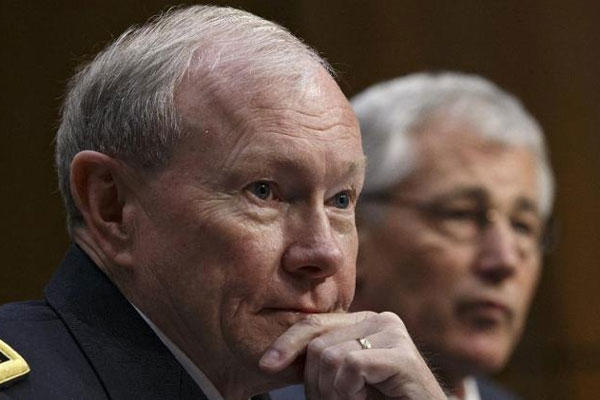The troops will grudgingly go along with the proposed cuts to military pay raises, benefits and health care, but they want certainty on when and how the changes go into effect, the nation's top general said Wednesday.
"I can't guarantee there'll be universal acclimation" in the ranks for the reductions, Chairman of the Joint Chiefs of Staff Army Gen. Martin Dempsey said on Wednesday during a congressional hearing. Troops have told him, "We want this done once," he said, with assurances that there won't be more cuts down the line.
Dempsey said the feedback he has received in meetings with the service members during a recent trip to Afghanistan, and from senior enlisted advisers, on compensation packages in the fiscal year 2015 defense budget could be summarized as, "Whatever we've got to do, let's do this once" and not let it drift.
The proposals to slow the growth of pay and benefits by increasing out-of-pocket fees for Tricare, among other initiatives, were major concerns at a Senate Armed Services Committee hearing that heard testimony on the budget from Dempsey and Defense Secretary Chuck Hagel.
The retiring Pentagon comptroller, Bob Hale, also spoke in what was likely one of his last appearances before Congress. Without the cuts, "we're going to have to cut training and maintenance, and we don't want to do that," he said.
Hagel said the proposed compensation reforms would save an estimated $31 billion over five years.
"We did not do this arbitrarily," the secretary and former senator said. "We know we can't continue to sustain the kind of growth (path) we're on.
"Overall, everyone's benefits will remain substantial, affordable and generous, as they should be," he added.
Sen. Lindsey Graham, R-S.C., said he supported the compensation changes, noting that Congress and the White House crated a funding crisis for defense by imposing automatic cuts known as sequestration. Slowing the growth of pay, benefits and health care was a valid response by the Pentagon, he said.
"As it grows, it crowds out the rest of the budget," Graham said.
Sen. John McCain, R-Ariz., who has clashed frequently with Hagel, hammered him again on offering a reduced defense budget while worldwide threats were increasing in Ukraine and elsewhere. "Your timing is exquisite," he said sarcastically.
Sen. Carl Levin, D-Mich., the committee's chairman, said the main problem with the Pentagon's $495.6 billion budget for fiscal 2015 and the projections for the next five years was the reliance on a total of $141 billion in additional funding that Congress might not approve.
Levin referred to the $115 billion the Pentagon would get if Congress lifted the mandatory cuts in the sequester process, and another $26 billion that would come from President Barack Obama's proposed Growth, Opportunity and Security Initiative, which called for tax increases to offset the spending.
Hagel was vague on what additional cuts would have to be made if Congress denied the extra money for defense, but said he would provide a list for the committee, possibly next week. Hale said that without more funding the active duty troop strength of the Army would reduce from the projected 510,000 at the end of this year to 420,000 in fiscal 2017.
Levin warned that it will be an uphill battle for more funding. "We will need some bipartisan cooperation" that has been lacking in Congress, he said.
Sen. Thad Cochran, R-Miss., said, "Before we talk about putting more money" into defense, "we're going to have to see numbers and be pretty specific about it."
Several senators pressed Hagel to eliminate what they called wasteful programs to avoid other cuts. They also charged that President Obama was sacrificing national security to protect domestic spending.
Sen. Kelly Ayotte, R-N.H., whose husband flew the A-10 Thunderbolt in Iraq, argued against the Pentagon's plan to retire all 283 of the aircraft better known as the "Warthog" by 2019.
Without giving details, Dempsey said he was possibly the one person in the hearing room who had personally benefited from the close air support missions flown by the A-10s. "The A-10 is the ugliest, most beautiful aircraft on the planet," the general said, but the mission of the aging fleet could be performed by other aircraft.
Sen. James Inhofe, R-Okla., said the federal government spent $120 billion to study and combat global warming "and that type of thing" from 2004-2009. For that amount of money, the Pentagon could have bought 1,400 F-35 Joint Strike Fighters, Inhofe said.
Sen. Ted Cruz, R-Tex., charged that the Defense Department was spending "billions" on alternative energy programs, such as algae fuel for the Navy, which would be better spent on boosting the number of troops in the Army and National Guard.
Hagel corrected Cruz, noting that algae fuel was a $170 million program, and said that the department had to look at alternative energy since "we are the largest energy consumer in the world." However, Hagel told Cruz that "I understand your point," and said he would get back to him with more details.
-- Richard Sisk can be reached at richard.sisk@monster.com

























